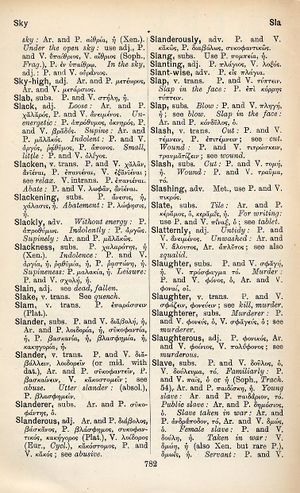slave
Εὐκαταφρόνητός ἐστι σιγηρὸς τρόπος → A way of life disposed to silence is contemptible → Taciturna facile ingenia contemni solent → Gemein ist ein Charakter, über den man schweigt
English > Greek (Woodhouse)
subs.
P. and V. δοῦλος, ὁ, V. δούλευμα, τό.
Familiarly: P. and V. παῖς, ὁ or ἡ (Soph., Trach. 54), Ar. and P. παιδίσκη, ἡ.
Young slave: Ar. and P. παιδάριον, τό.
Public slave: Ar. and P. δημόσιος, ὁ.
Slave taken in war: Ar. and P. ἀνδράποδον, τό, Ar. and V. δμώς, ὁ.
Female slave: P. and V. δούλη, ἡ.
Taken in war: V. δμώη, ἡ (also Xen. but rare P.), δμωίς, ἡ.
Servant: P. and V. ὑπηρέτης, ὁ; see servant.
Be a slave to: P. and V. δουλεύειν (dat.), λατρεύειν (dat.).
A slave to: Met., P. and V. δοῦλος (gen.), ἥσσων (gen.), ἡσσημένος (gen.).
Like a slave, adj.: V. ἀντίδουλος.
Unprotected by slaves: V. ἄδουλος.

